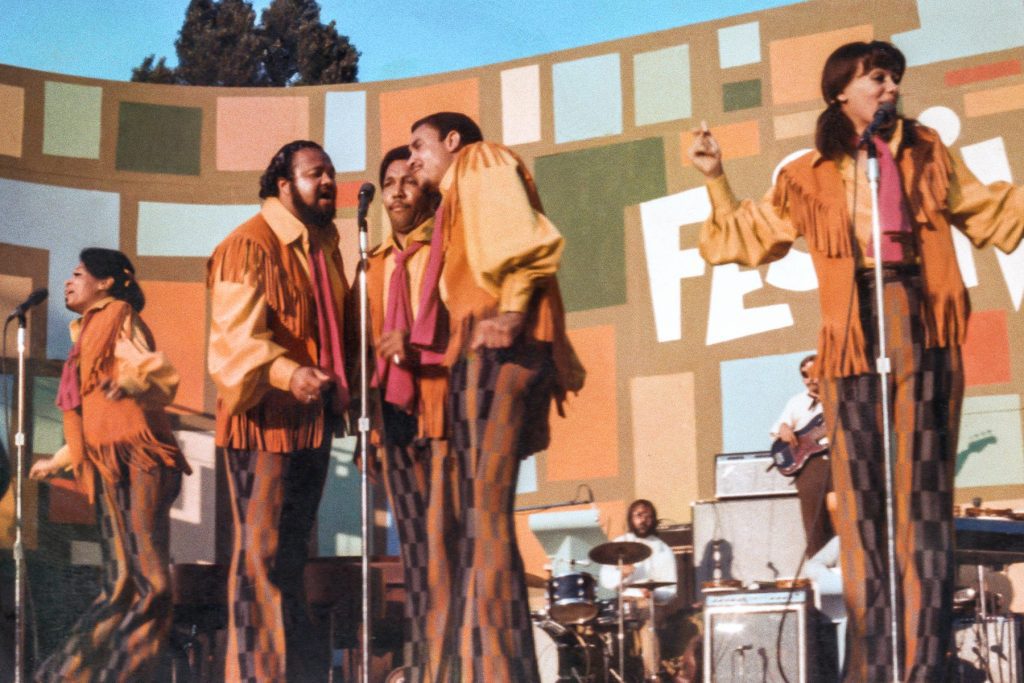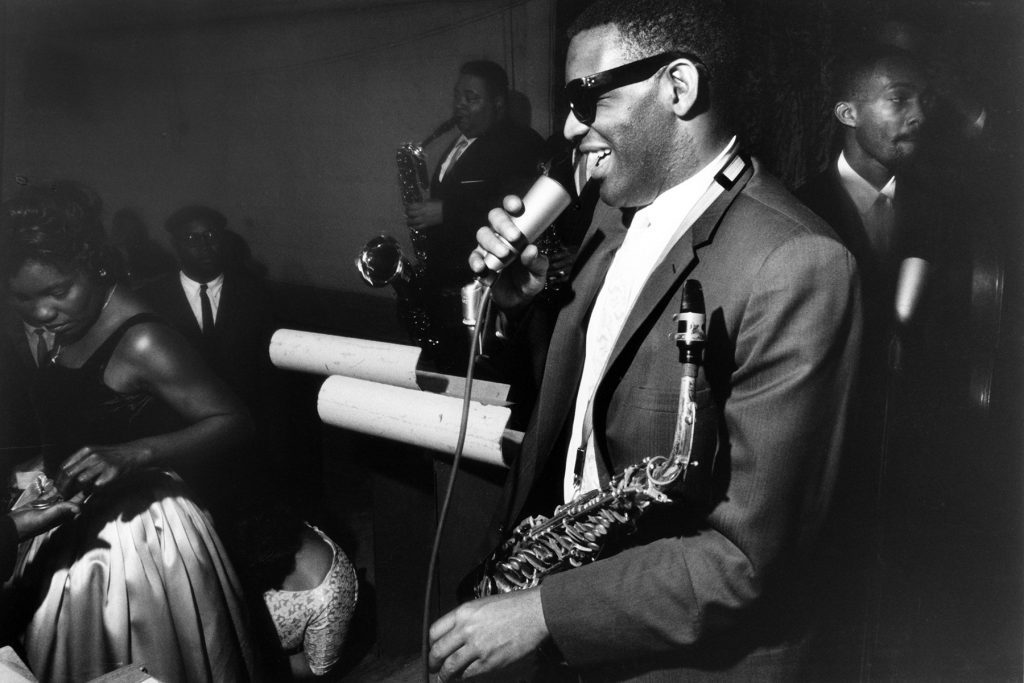
‘Let the Sunshine In’: Remembering the 5th Dimension’s Quiet Revolution
There are many reasons to revel in Summer of Soul, the acclaimed music doc premiering on Hulu this weekend. Across six days in 1969, tens of thousands of people streamed into a park in Harlem to see performances by Stevie Wonder, Nina Simone, B.B. King, Sly and the Family Stone, and many more. Respectfully compiled by first-time director Ahmir “Questlove” Thompson, the forgotten footage from the Harlem Cultural Festival has been condensed into a two-hour movie that’s more than just another concert film. From Sly’s anthemic “Everyday People” to then-and-now interviews with audience members, and even an Afrocentric TV ad from the festival’s coffee-maker sponsor, the movie is a time capsule of shifting trends in music, fashion, and politics in black America as the Sixties wound down.
And yet another reason to applaud it? It finally gives another one of its performers, the 5th Dimension, an overdue spotlight.
As co-lead singer Billy Davis Jr. acknowledges in the film, the 5th Dimension were blessed and cursed. Coming together from worlds as varied as pop and gospel, the quintet were, in a way, a black version of the Mamas and the Papas. Their harmonies were similarly sunny and enveloping, and one of their earliest hits was, in fact, a cover of John Phillips’ “Go Where You Wanna Go.”
blogherads.adq.push(function () {
blogherads
.defineSlot( ‘medrec’, ‘gpt-dsk-tab-article-inbody1-uid0’ )
.setTargeting( ‘pos’, [“mid-article”,”mid”,”in-article1″,”mid-article1″] )
.setSubAdUnitPath(“music//article//inbody1”)
.addSize([[300,250],[620,350],[2,2],[3,3],[2,4],[4,2]])
;
});
But it was 1967’s “Up, Up and Away,” Jimmy Webb’s cottony ode to balloons (literally or metaphorically), that vaulted the 5th Dimension into the worlds of Top 40 radio, nightclubs, and TV. From then and into the early Seventies, they were a ubiquitous presence — on tour, variety shows, and radio, especially when singles like the sublime sad-sack classic “One Less Bell to Answer” or the ebullient “Wedding Bell Blues” connected.
As their segment in Summer of Soul demonstrates, the 5th Dimension were a proud throwback at a time when R&B and soul were evolving, growing more socially conscious and rejecting musical conventions. Onstage in Harlem, they’re wearing matching orange outfits (“creamsicle”-colored, as one interviewee bemusedly remarks), with the three male members in matching red ties. Their clip is dominated by “Aquarius/Let the Sunshine In (The Flesh Failures),” their medley of songs from the hippie musical Hair that was impossible to avoid on pop radio in 1969. With their synchronized dance moves, celestial harmonies, and eager-to-please aura, you can see why they were regulars on the likes of The Ed Sullivan Show, but Davis’ throaty ad-libs during the song’s second half bring the performance back to church, where he began singing. (And check out studio bassist Joe Osborne’s insane bass line during the “Let the Sunshine In” part of the studio recording.)
But in a scenario that’s nearly impossible to imagine for a modern act, the 5th Dimension also became victims of their own success. In an extended Summer of Soul segment, Davis and Marilyn McCoo, the group’s most prominent female member, rewatch the footage with equal degrees pride and pain. “We were constantly being attacked because we weren’t ‘black enough,’” McCoo says. “Sometimes we were called the black group with the white sound, and we didn’t like that. … Our voices sound the way they sound. How do you color a sound?” As Davis adds, “Everyone thought we were a white act until they saw pictures.” Those poignant moments recall similar put-downs that Whitney Houston endured two decades later, after she began pulling in both black and white audiences with her first two albums.
It’s doubtful that even the members of the 5th Dimension would have called themselves radicals. In Summer of Soul, the juxtaposition of their Vegas-friendly performance alongside the simmering fury of Nina Simone or the interracial funk of Sly and the Family Stone drives that point home.
blogherads.adq.push(function () {
blogherads
.defineSlot( ‘medrec’, ‘gpt-dsk-tab-article-inbody2-uid1’ )
.setTargeting( ‘pos’, [“mid-article2″,”mid”,”in-article2″,”mid-article”] )
.setSubAdUnitPath(“music//article//inbody2”)
.addSize([[300,250],[300,251],[620,350],[2,4],[4,2],[3,3]])
.setLazyLoadMultiplier(2)
;
});
But in their understated way, the 5th Dimension moved the needle. They helped introduce a generation of kids to the songs of Webb and the late Laura Nyro. Their second album, the all-Webb The Magic Garden, wedded their vocals to the songwriter’s ambitious pop concoctions, resulting in the airport-lounge version of Sgt. Pepper. (“Carpet Man” also channels Brill Building chug.) Aiming to become politically relevant, they sang the entire Declaration of Independence on their 1970 album Portrait, a ballsy move that ate up 10 minutes on the record. You’d like to think Thomas Jefferson would have approved of any effort to remind Americans, nearly 100 years after the fact, what was in those pages. The mere fact that the 5th Dimension were regulars on prime-time network TV, along with Motown acts, was a statement in and of itself. Their music — from the effervescent melodies of hits like “California Soul” to the way their voices would come together after one of them took a solo — didn’t convey indignation but communal joy.
Any of the numerous 5th Dimension anthologies still available are filled with treasures, some buried. The McCoo showcase “(Last Night) I Didn’t Get to Sleep at All” is one the most beautifully melancholic pop songs ever. Their version of Nyro’s “Stoned Soul Picnic” isn’t as earthy as Nyro’s own, but it glides on air, and their jubilant covers of her “Wedding Bell Blues,” “Save the Country,” and “Sweet Blindness” make you wish they’d also cut an album entirely of Nyro songs. Listen as McCoo and Davis (who would marry in 1969) exalt in each other in “Together Let’s Find Love,” one of their later and sometimes forgotten hits.
McCoo and Davis left the group in the mid-Seventies (and continue to work together, recently releasing a new album of Beatles covers). The other original members — Florence La Rue, Lamonte McLemore, and Ronald Townson — carried on, with different bandmates and record companies, but never regained their former status. By then, the rise of disco and funk finally made the group anachronistic.
But given the grief they sometimes received — along with, admittedly, sizable paychecks — it’s reassuring to see the positive response the group receives in Summer of Soul. Few in the crowd seem to care that they’d crossed over; to use a hoary phrase, it was the music that mattered. Summer of Soul’s subtitle may be (…Or, When the Revolution Could Not Be Televised). But the 5th Dimension’s quiet revolution was aired plenty — and, at one time, for many to witness.




